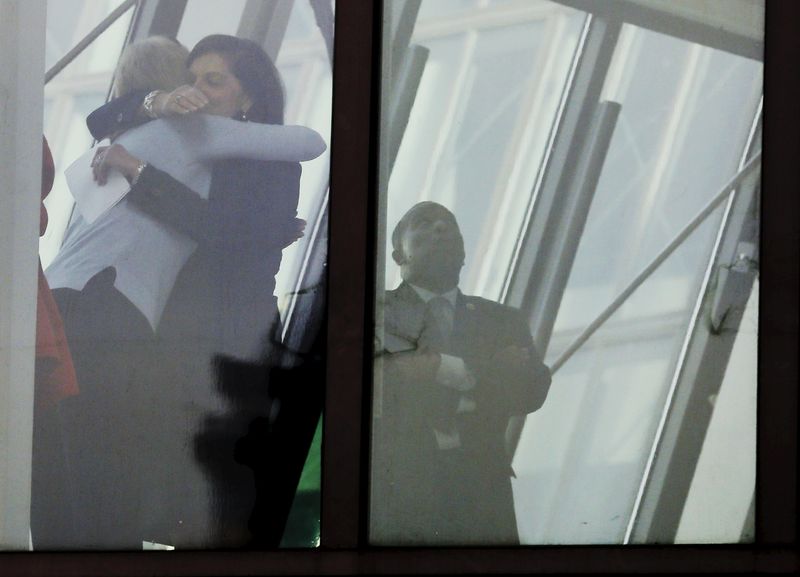By Scott Malone and Elizabeth Barber
BOSTON (Reuters) - Boston Marathon bomber Dzhokhar Tsarnaev was sentenced to death by a U.S. jury on Friday for helping carry out the 2013 attack that killed three people and wounded 264 others in the crowds at the race's finish line.
After deliberating for 15 hours, the federal jury chose death by lethal injection for Tsarnaev, 21, over its only other option: life in prison without possibility of release.
The same jury found Tsarnaev guilty last month of placing a pair of homemade pressure-cooker bombs on April 15, 2013, as well as fatally shooting a policeman. The bombing was one of the highest-profile attacks on U.S. soil since Sept. 11, 2001.
Tsarnaev, dressed in a dark sport coat and light-coloured shirt, stood quietly as the sentence was read, remaining expressionless as he had throughout most of the trial.
During 10 weeks of testimony, jurors heard from about 150 witnesses, including people whose legs were torn off by the shrapnel-filled bombs. William Richard, the father of bombing victim Martin Richard, described the decision to leave his 8-year-old son to die of his wounds so that he could save the life of his daughter, Jane, who lost a leg but survived.
Prosecutors described Tsarnaev, who is an ethnic Chechen, as an adherent of al Qaeda's militant Islamist views who carried out the attack as an act of retribution for U.S. military campaigns in Muslim-majority countries.
The jury's decision does not mean Tsarnaev will face imminent death. Defence attorneys are likely to appeal the sentence, a process that can stretch out for many years.
"I know that there is still a long road ahead," said survivor Karen Brassard, whose left leg was badly injured in the attack. "There are going to be many, many dates ahead. But today we can take a breath, and actually breathe again," she told reporters.
An appeal could focus on a number of issues, including the court's denial of a defence plea to move the trial out of Boston or refusal to challenge the graphic photos and videos that the jury saw of the bombs' detonation and the severe wounds they inflicted.
Prosecutors do have a burden of proof to show that people died, but the appeal argument would be that there is a balance to be struck and they went over that line," said David Weinstein, an attorney in private practice who in prior jobs as a state and federal prosecutor brought death-penalty cases.
DEATH PENALTY CONTROVERSIAL IN MASSACHUSETTS
The death penalty remains highly controversial in Massachusetts, which has not put anyone to death in almost 70 years and which abolished capital punishment for state crimes in 1984. Tsarnaev was tried under federal law, which allows for lethal injection as a punishment.
Polls had shown that a majority of Boston-area residents opposed executing Tsarnaev.
Opponents included Martin Richard's parents, who said in an open letter to the Justice Department last month that they wanted Tsarnaev to face life in prison rather getting a death sentence that would likely lead to years of appeals, keep the defendant in the spotlight and prevent them from trying to rebuild their lives.
A lengthy appellate process, an effective moratorium on federal executions and declining support among Americans for capital punishment all suggest that Tsarnaev's death is far from a sure thing, according to death penalty experts. Instead, it may end as a purely symbolic judgement.
"With every passing year, the likelihood of execution will diminish," said Deborah Denno, a law professor at Fordham University who has studied capital punishment."
Just three of the 74 people sentenced to death in the United States for federal crimes since 1988 have been executed. The first was Timothy McVeigh, put to death in June 2001 for killing 168 people in his 1995 attack on the federal government office building in Oklahoma City.
Other people convicted of attacks labelled as terrorist by the U.S. government, including 9/11 conspirator Zacarias Moussaoui and shoe-bomber Richard Reid, drew life prison sentences.
Prosecutors focused heavily on Tsarnaev's turn to radical Islamist views, showing the jury copies of the al Qaeda magazine article that demonstrated how to build a pressure-cooker bomb.
"The defendant claimed to be acting on behalf of all Muslims. This was not a religious crime," said Carmen Ortiz, the top federal prosecutor in Boston. "It was a political crime designed to intimidate and coerce the United States."
Tsarnaev's attorneys admitted his involvement in the attack from the start of the trial, but argued that he was a junior partner in a scheme hatched and run by his 26-year-old brother, Tamerlan. Tamerlan died after a gunfight with police four days after the bombing, which ended when Dzhokhar ran him over with a stolen car.
A Roman Catholic nun who is a prominent opponent of the death penalty, Sister Helen Prejean, testified for the defence she had met with Tsarnaev and he told her "no one deserves to suffer" as his victims had. Prejean, a Nobel Peace Prize nominee, said she believed he was "genuinely sorry" for his actions.
But the jury found Tsarnaev deserved execution for six of the 17 capital charges of which he was found guilty. Those counts were the ones tied to the bomb that he personally placed at the marathon finish line, which killed Richard and 23-year-old Chinese exchange student Lingzi Lu.
They did not find him deserving of death for the crimes tied to the bomb placed by his brother, which killed 29-year-old restaurant manager Krystle Campbell, or for the fatal shooting of Massachusetts Institute of Technology police officer Sean Collier, 26.
Tsarnaev's attorney's left the courthouse without commenting to reporters.

Tsarnaev himself was impassive throughout the trial, and did not testify in his own defence.